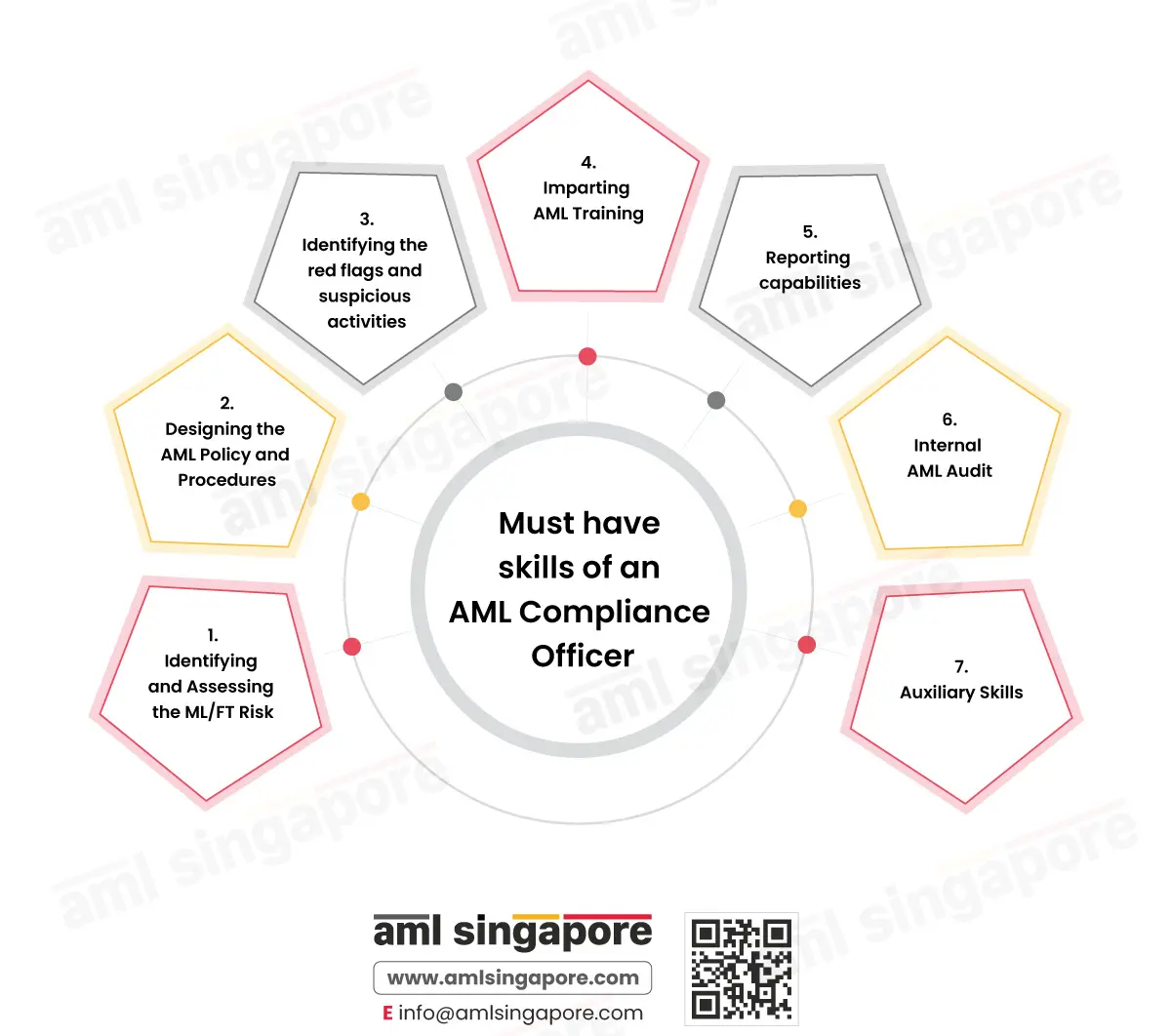What skills should an AML Compliance Officer possess?
What skills should an AML Compliance Officer possess?
Appointment of an AML Compliance Officer is mandatory as per Singapore AML rules and regulations. The AML laws provide that the regulated entities, including Financial Institutions and Designated Non-Financial Businesses and Professions (DNFBPs), must appoint a competent AML Compliance Officer. The Compliance Officer has a key role in the overall AML compliance process. The Compliance Officer designs the AML Compliance framework, periodically checks the efficiency of the AML measures, ensures that the AML Program is appropriately implemented, and drives toward the desired results of combating financial crimes and safeguarding the business.
The Compliance Officer manages the organization’s AML/CFT Program and makes sure of compliance with the applicable AML regulatory landscape.
Let’s delve more into the details and know what skills an AML Compliance Officer should possess.
Must have skills of an AML Compliance Officer
As the primary driver of the AML Compliance ride, the AML Compliance Officer must possess the skills to ensure effective and complete compliance with Singapore’s AML regime:
Identifying and Assessing the ML/FT Risk:
The AML Compliance Officer is responsible for accurately assessing the ML/FT risk the company is exposed to and evaluating the possible impact of the same on the business if such risk materializes. The AML officer must understand the business and be in a position to identify the risks factors necessary to take into consideration for conducting the Enterprise-Wide Risk Assessment, such as the nature and size of the business, the customer’s profile, the nature of the goods traded or services provided, the jurisdiction in which the company operates, including the location of the customers, etc.
Designing the AML Policy and Procedures:
Identifying the red flags and suspicious activities:
Transaction monitoring is a continuous process involving continuous tracking of the customer’s profile and transactions to identify any suspicious transactions or inconsistent activities throughout the lifecycle of the business relationship.
Companies must find unusual transaction patterns and recognize money laundering attempts. An AML Compliance Officer must be capable of effectively and timely handling the alerts generated during the transaction monitoring program. The officer must have data analysis skills to spot the risk indicators and take necessary actions.
Imparting AML Training:
As the head of the AML compliance function of the company, an AML Compliance Officer’s skill must include providing appropriate AML training to the employees and stakeholders to create awareness around AML regulatory obligations and the team’s role in managing the same. The training is essential to let the employees correctly adopt the Customer Due Diligence measures in accordance with the customer’s risk rating and ensure financial criminals do not misuse the business.
Reporting capabilities:
The AML Compliance Officer should possess reporting skills. AML Officer is ultimately responsible for reporting suspicious transactions to the Suspicious Transactions Reporting Office. Further, the Compliance Officer also needs to collaborate with regulators, stakeholders, and law enforcement authorities to submit comprehensive information on the AML compliance process of the organization. The reports help the government take action to prevent money laundering.
Internal AML Audit:
The Compliance Officer is also responsible for conducting periodic audits of the implemented AML program and gauging the quality and adequacy of the AML controls. The officer must be capable of critically evaluating the implemented IPPC and implementing enhanced measures to rectify the existing AML gaps or weaknesses.
Other vital skills:
- An AML compliance officer must have extensive knowledge of the AML rules and regulations. Though there’s no specific profile of the AML officer and educational background, having business acumen, sharp interpretation skills, good at numbers, and understanding government rules and regulations helps implement the regulatory requirements. The Compliance Officer’s awareness of the international best AML practices would help the organization maintain a competitive edge and gain the customers’ and stakeholders’ trust in the company.
- The person should have leadership skills and communicate efficiently with the organization and employees. The person should have the wisdom to maintain discretion to safeguard sensitive information while ensuring necessary details are disseminated to senior management and relevant team members.
- Another AML analyst skill is that the officer should have the capability to work as a team where the officer is required to collaborate with regulatory authorities and relevant stakeholders and collaborate with them to achieve the goals of the AML compliance process.
- Other AML skills, such as having an unbiased opinion on the AML health of the business and suggesting the best measures to improve it. The officers should have the skills to operate independently and gain a deep understanding of the business’ compliance requirements. The AML officer must be capable of managing the conflict of interest between AML compliance and the business.
Set your AML function right with an AML Compliance Officer
The compliance officer’s skills include risk assessment of the business, identifying high-risk clients, reporting suspicious transactions, found if any, and reporting them to the concerned authorities. The officer helps implement the anti-money laundering program efficiently and ensures that the business integrates an AML compliance system that meets global standards.
The officers must be knowledgeable and have the experience to ensure the business stays AML compliant. They are responsible for the company’s regulatory compliance process, report creation, transaction monitoring, and helping the business safeguard customers’ interests.
Let AML Singapore assist you with your AML journey by identifying the right AML Compliance Officer to stay compliant with Singapore AML regulations and safeguard businesses against financial crime. We understand your business requirements and will help you appoint an MLRO to fulfill the regulatory requirements and streamline your AML compliance program. Benefit from the compliance officer’s experience and expertise and shield your organization from the threat of money laundering and financing of terrorism.

About the Author
Pathik Shah
FCA, CAMS, CISA, CS, DISA (ICAI), FAFP (ICAI)
Pathik is a Chartered Accountant with more than 26 years of experience in governance, risk, and compliance. He helps companies with end-to-end AML compliance services, from conducting Enterprise- Wide Risk Assessments to implementing the robust AML Compliance framework. He has played a pivotal role as a functional expert in developing and implementing RegTech solutions for streamlined compliance.



